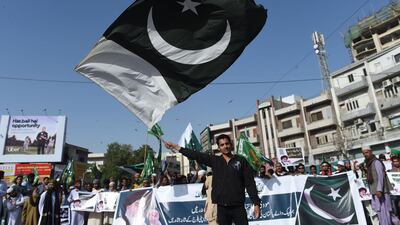Why did a small squadron of Indian Mirage 2000 fighter aircraft enter Pakistani airspace and launch four bombs that landed on the side of a small hill in the semi-rural region of Balakot? Following the February 14 suicide bombing in Pulwama, in Indian-occupied Kashmir, Prime Minister Narendra Modi – who is primed for a heated electoral contest later this year – needed to show the people of India his resolve to wipe out any challenge to the country's claims on the disputed region.
When the decision to attack Pakistan was made in New Delhi, India held one trump card: a video statement made by the man who drove more than 350kg of explosives into a convoy packed with Indian soldiers, killing 40 of them. In it, the bomber claimed to be from the banned terrorist group Jaish-e-Mohammed (JeM). The group was added to the UN Security Council Resolution 1267 Al Qaeda Sanctions Committee soon after September 11, 2001. It was banned in Pakistan a few months after that.
Global powers – especially the United States, France and Germany – have long taken the view that organisations such as JeM present an unacceptable risk, not only for the South Asia region, but for wider global stability. Any time India is able to link the trouble in Kashmir to such organisations, Western powers tend to line up behind it. And lining up behind India means taking the same tone of disapproval that these countries have taken with Pakistan for the better part of a decade. Pakistan being repeatedly told to “do more” to combat extremism has been a punchline in the nation since the early Obama years.
However, Pakistan – which for years, used to blush and look away when urged to “do more” – has spent the past five years locked in a fierce war against terrorists, including a large number of former JeM fighters. Many Pakistanis, and particularly the officers that run its powerful military, view these years of struggle with great pride. No country has been able to defeat a violent insurgency in the way Pakistan has – wresting back territory, imagination and narratives – since 2014, when more than 140 children were slaughtered by terrorists in a school in Peshawar.
In short, when calculating the odds on how quickly and competently Pakistan would retaliate against India’s attack in Balakot, Mr Modi and his government failed to take into account the battle-hardened nerves of Pakistan’s elected leaders, its generals and the wider public.
All day, on February 26, the broadly measured response of Pakistanis to an attack on their country and the capture of an Indian Air Force pilot from a downed fighter jet was clear to see. In stark contrast, India's news media, including many senior journalists with a long track record of professionalism, seemed to have been cheerleading not only the Indian attack, but also the wild claims of heavy casualties on the Pakistani side – none of which have been verified.
At present, there is a strange sense of quiet triumph in Pakistan. Prime Minister Imran Khan gave an impressive four-minute speech in which he invited Mr Modi to talk to him, and cited the many historical follies that have led to brutal wars and massive losses of life. And, for the time being – despite reports of gunfire being exchanged by troops along the border – it seems that India may resist the urge to further inflame tensions by escalating once again.
But it would be a grave error to breathe a sigh of relief just yet. India’s summer election is set to get extremely heated for Mr Modi and the extremist wing of his Hindu nationalist Bharatiya Janata Party. Already, Indian opposition parties are raising legitimate questions about why he put two of the nation’s fighter jets in harm’s way, allowing them to cross into Pakistani airspace, and making them vulnerable to being taken down.
When politicians in India come under pressure on the issue of Pakistan, very few are able to resist raising the stakes.
If India was to escalate, it is now clear that Mr Khan and the army chief General Qamar Javed Bajwa have the confidence to retaliate. But where would such tit-for-tat actions end? That is exactly the question Mr Khan posed to Mr Modi in his speech.
One place we know they will not end is in a resolution of the unresolved status of Kashmir. Kashmiris have spent 70 years arguing and fighting for their right to self-determination. Events there can certainly take Pakistan and India to the brink of war, but they have never brought them closer to fixing the problem itself. The big prize in the Pakistan-India stand-off should not be bragging rights over acts of war. It should be peace and stability in Kashmir.
Mosharraf Zaidi is a Pakistani public policy professional

